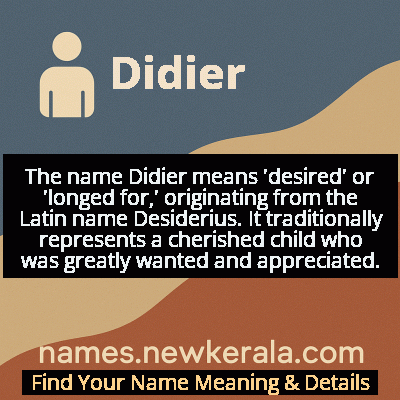Didier Name Meaning & Details
Origin, Popularity, Numerology Analysis & Name Meaning of Didier
Discover the origin, meaning, and cultural significance of the name DIDIER. Delve into its historical roots and explore the lasting impact it has had on communities and traditions.
Name
Didier
Gender
Male
Origin
French
Lucky Number
4
Meaning of the Name - Didier
The name Didier means 'desired' or 'longed for,' originating from the Latin name Desiderius. It traditionally represents a cherished child who was greatly wanted and appreciated.
Didier - Complete Numerology Analysis
Your Numerology Number
Based on Pythagorean Numerology System
Ruling Planet
Uranus (Rahu)
Positive Nature
Strong sense of order, loyal, practical, and disciplined.
Negative Traits
Stubborn, overly serious, rigid, and prone to feeling restricted.
Lucky Colours
Blue, gray.
Lucky Days
Saturday.
Lucky Stones
Blue sapphire.
Harmony Numbers
1, 7, 8.
Best Suited Professions
Managers, engineers, accountants, organizers.
What People Like About You
Dependability, discipline, practicality.
Famous People Named Didier
Didier Drogba
Professional Footballer
Chelsea legend and Ivory Coast national team captain, considered one of Africa's greatest footballers
Didier Deschamps
Football Manager and Former Player
Won World Cup as both player (1998) and manager (2018) for France, only the third person to achieve this
Saint Didier of Cahors
Bishop and Saint
Medieval bishop known for his piety, church building, and influence in Merovingian France
Didier Raoult
Microbiologist and Physician
Renowned French infectious disease specialist and researcher, director of IHU Méditerranée Infection
Name Variations & International Equivalents
Click on blue names to explore their detailed meanings. Gray names with will be available soon.
Cultural & Historical Significance
In modern times, Didier became particularly fashionable in France during the mid-20th century, peaking in popularity between the 1950s and 1970s. The name carries connotations of traditional French values, intellectualism, and cultural sophistication, often associated with educated, middle-class families who value heritage and tradition. Its enduring presence in French culture reflects the nation's appreciation for historical names with religious and cultural depth, serving as a bridge between France's Christian past and its contemporary identity.
Extended Personality Analysis
Individuals named Didier are often perceived as sophisticated, intellectual, and culturally aware. They typically exhibit a refined taste in arts and literature, combined with a practical approach to problem-solving. Didiers are known for their diplomatic nature, able to navigate complex social situations with grace and tact. Their name's meaning of 'desired' often translates into a personality that seeks to be appreciated and valued in both personal and professional relationships.
Many Didiers display strong leadership qualities tempered with emotional intelligence, making them effective in management and collaborative environments. They tend to be methodical thinkers who value tradition while remaining open to innovation when properly justified. The name carries an air of quiet confidence rather than overt assertiveness, with bearers often preferring substance over showmanship. Their communication style is typically articulate and considered, reflecting the name's association with French intellectual and cultural traditions. Didiers are generally reliable, loyal friends and partners who value deep, meaningful connections over superficial relationships.
Modern Usage & Popularity
In contemporary times, Didier remains a recognizable and respected name in French-speaking countries, though its popularity has declined from its mid-20th century peak. The name is now considered somewhat traditional and is less common among younger generations, but maintains a presence due to its strong cultural roots. In France, it ranks outside the top 200 baby names but continues to be used by families valuing traditional French nomenclature. The name enjoys particular resonance in professional and academic circles, where its sophisticated connotations are appreciated. Internationally, Didier is recognized primarily through famous bearers like Didier Drogba and Didier Deschamps, which has maintained its global visibility. While not trending upward, the name's classic nature ensures it never completely falls out of use, often chosen by parents seeking a name with historical depth and cultural authenticity rather than contemporary fashion.
Symbolic & Spiritual Meanings
Symbolically, Didier represents desire, aspiration, and cherished values. The name embodies the concept of something deeply wanted and valued, reflecting both personal longing and collective appreciation. In metaphorical terms, it suggests a bridge between tradition and aspiration—honoring historical roots while reaching for meaningful goals. The name carries connotations of refinement and cultivated taste, symbolizing the French ideal of 'art de vivre' or the art of living well. It represents intellectual curiosity combined with practical wisdom, and often symbolizes the balance between emotional depth and rational thought. In broader cultural symbolism, Didier evokes the enduring qualities of French civilization: elegance, intelligence, and a deep appreciation for beauty and tradition. The name suggests someone who is both grounded in reality and capable of aspiring to higher ideals, making it symbolic of human potential and cultural continuity.

